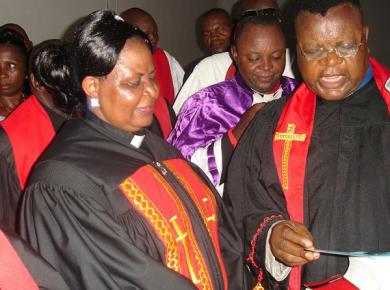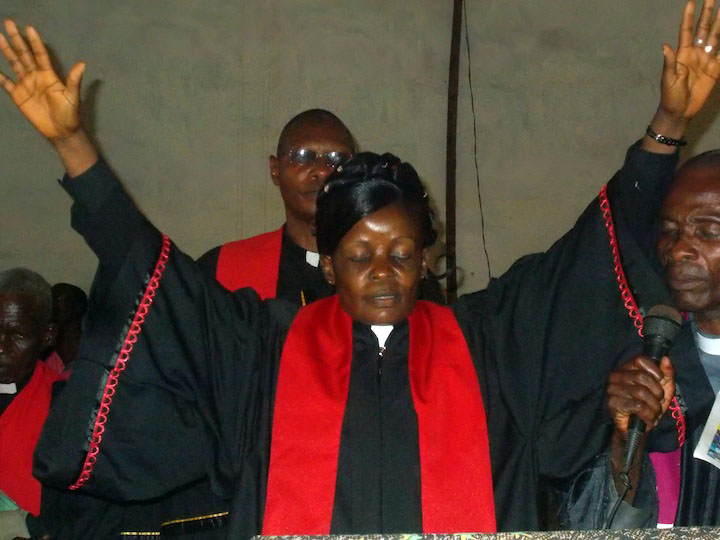Posted: July 3, 2014
Kinshasa, DR Congo – In July 2012, Sidonie Swana Falanga heard news that she thought was too good to be true. The 100-year-old Communauté Mennonite au Congo (Mennonite Church of Congo, or CMCo) had approved the ordination of women.
“I asked myself, is it an invention, a lie, a dream, or a wish?” she said in a recent interview.
As one report after another confirmed that the church’s leaders had indeed decided at their biennial assembly to offer the sacrament of ordination to women, Swana said her doubts shifted into “a small joy and a small sadness because the thing took too long.”
By the count of one leader, the question had come to a vote before seven assemblies before passing.
Finally, at the celebration of her own ordination just over a year later, Swana said that her joy became “large and complete.”
The sentiment was echoed by many in the crowd of more than 1,000 Congolese Mennonites who gathered in Kinshasa, capital of the Democratic Republic of Congo, on 22 September, 2013, to celebrate as Swana and Fabienne Ngombe Kidinda became the first women to be ordained to ministry in the CMCo.
Two men were also ordained on that occasion.
“This is a very special day for the Mennonite Church,” CMCo President Adolphe Komuesa Kalunga proclaimed in his address.
“The door is wide open to you,” he said to the women in the assembly. “The barrier is broken.”
Eric Mukambu N'yamwisi, a Kinshasa pastor, said the ordinations were “an immense joy. I began advocating for women’s ordination at age 25 and I am now 52. It took time for us to explain that to the church.”
A third woman of the denomination, Bercy Mundedi, was ordained in Kalonda, Western Kasai Province, on 6 October, along with four men.
The five-hour services in Kinshasa and Kalonda included multiple choral performances, instructions to the candidates and their congregations and jubilant dancing and gift giving. Sermons and comments from witnesses focused on the biblical and social bases for women's leadership.
Responses to women’s ordination
Leaders in the CMCo and beyond have voiced both strong support and concern about the church’s decision to ordain women.
“We have been practicing sexual discrimination. That is not good for the church,” said Paul Kadima, a Kinshasa pastor. “Now we have put in practice Galatians 3:28. In the church we are equal.”
Robert Irundu, CMCo’s national youth president, said he believed it took time for the church to approve women's ordination “because CMCo wanted to study the declaration of Paul requiring women to be silent in the assembly. But the Bible also says there is no distinction between men and women.”
Others were more blunt. “Many of our pastors had a very conservative spirit,” said Rev. François Shopo at the Kinshasa gathering.
Anastasie Tshimbila, an instructor at Kalonda Bible Institute, said the 2012 decision had stirred controversy in the Kasai region, where CMCo has its headquarters, because “some tribal traditions are very oppressive toward women.” She added, “Some radio call-in programs aired a lot of opposition. But many supported the decision as well. Women welcomed it.”
Hon. Madeleine Musaga, a Mennonite woman who is a national deputy representing Gungu in Bandundu Province, said, at the Kinshasa ceremony, “This is a holy day for me, to see women honored. Women should hold their heads high and men should support them. We women are fighting for decision-making posts in politics, and we must also do that in the church.”
Charlotte Djimbo Ndjoko, a Mennonite Brethren woman who lives in Kinshasa, said that the newly ordained women “have struggled along with men for years and years for this ordination. Men have resented them. Thanks be to God that these men have now recognized that women have a place in the church in pastoral ministry and evangelization. We are very happy. We will support them as Mennonite sisters. And we invite other women and girls to join them.”
Journey toward women’s ordination
CMCo is the last of the three Mennonite communities in Congo to ordain women. Communauté des Églises de Frères Mennonites au Congo (Mennonite Brethren Church of Congo) has been ordaining women since 2000. Communauté Évangélique Mennonite (Evangelical Mennonite Church of Congo) ordained a woman for the first time in July 2012, during celebrations of the church's fiftieth anniversary.
Swana, 59, received a degree in theology in 1995 and has long served in a pastoral role alongside her husband, Rev. Léonard Falanga. She has been a leader in organizing women who have studied theology, in teaching on the issue and in attempting to persuade church leaders and pastors that women's ordination is based on biblically sound principles.
Ngombe, 63, received a degree in theology in 1998 and has served as an assistant pastor in several Kinshasa churches since 2005.
All three women studied at the Protestant University of Kinshasa, now known as Christian University of Kinshasa. Mundedi, 47, graduated in 1996.
Mundedi said women in her native Mennonite congregation in Nyanga, Western Kasai, urged her to study theology. “I began preaching in school when I was 14,” she said. After completing theological studies she returned to Nyanga to teach and serve as a school chaplain, “in gratitude to those who first called me.”
In 2005 she began teaching at Kalonda Bible Institute, where she and Anastasie Tshimbila are on the faculty, along with five men. Four women are currently enrolled as students at Kalonda, a three-year post-secondary school that has trained many CMCo pastors.
Six North American Mennonites, including three ordained women—Sandy Miller and Paula Killough of Mennonite Mission Network in Elkhart, Indiana, USA; and Amanda Rempel of Newton, Kansas, USA—attended the ordinations in Kinshasa and Kalonda at the invitation of Congolese church leaders.
“The presence of this delegation is a sign of the love that exists between Mennonites,” Swana said.
The three American women were invited to join CMCo pastors in laying hands on, and praying for, the women and men who were being ordained.
While the struggle for women’s ordination was long and exhausting at times, Swana said, “We recognize that everything has its time, as written in Ecclesiastes 3.”
In November, two more CMCo women, identified by church leaders as Mubi Mutemba and Mundombila, will be ordained in Kananga, Western Kasai.
Article by Nancy Myers, a freelance writer on assignment for Africa Inter-Mennonite Mission and Charlie Malembe, a Mennonite journalist in Kinshasa.
Bercy Mundedi pronounces the benediction after her ordination in Kalonda. Photo by Charlie Malembe
Fablienne Ngombe Kidinda receives a clerical collar from CMCo president Adolphe Komuesa at her ordination in Kinshasa. Photo by Nancy Myers



Comments: